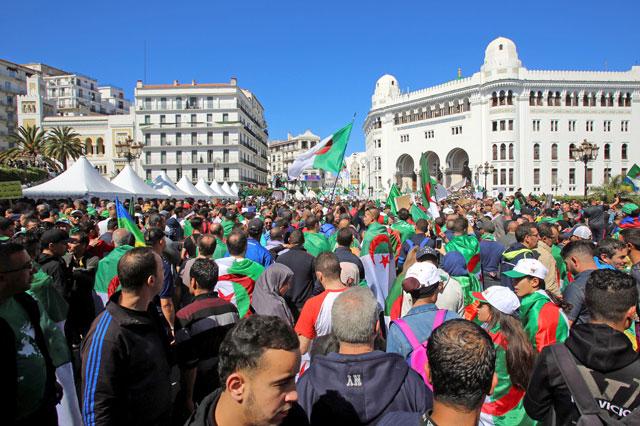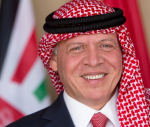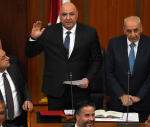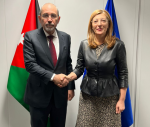You are here
Algerian army chief wants ruling ‘gang’ prosecuted, backs route to elections
By Reuters - Apr 11,2019 - Last updated at Apr 11,2019
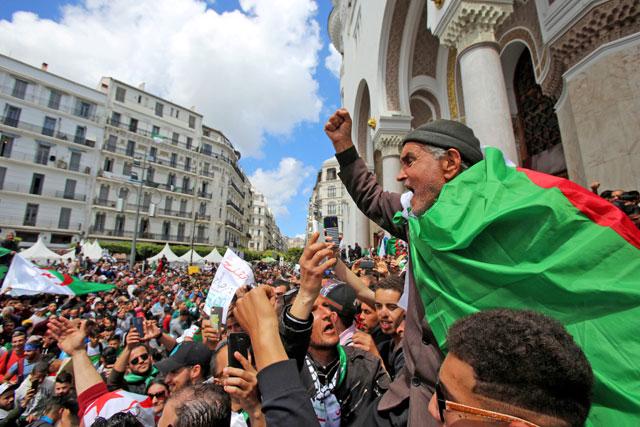
A man gestures during a protest against the appointment of interim president Abdelkader Bensalah demanding radical changes to the political system, in Algiers, Algeria, on Wednesday (Reuters photo)
ALGIERS — Algeria’s army chief said on Monday he expects to see members of the ruling elite prosecuted for corruption and will support a transition towards elections after mass protests ousted the long-serving president.
Lt. Gen. Gaid Salah’s comments were the strongest hint yet that the military would play its traditional role as kingmaker following veteran leader Abdelaziz Bouteflika’s resignation after 20 years in office.
“The army will meet the people’s demands,” said Salah, addressing officers and soldiers at a military base. “The judiciary has recovered its prerogative and can work freely.”
He referred to the ruling caste as “the gang”, a term people have used in the protests to describe Bouteflika’s inner circle, which encompassed retired intelligence officials, oligarchs, members of the ruling National Liberation Front (FLN) and some veterans of the 1954-62 war of independence against France.
The army chief of staff urged the judiciary to reopen a corruption case against oil and gas giant Sonatrach, an object of resentment for many Algerians who accuse their leaders of stealing the north African nation’s wealth.
More than one in four people under the age of 30, some 70 per cent of the population, are unemployed — one of the central grievances of protesters who want the economy liberalised and diversified to reduce its reliance on energy.
In 2012, a series of scandals shook Sonatrach, which was tightly controlled by Bouteflika loyalists. Its CEO and other executives were imprisoned for graft offences.
Cautious army chief
The army patiently observed the unrest, which started on February 22, from the sidelines. Then Salah intervened, declaring the 82-year-old Bouteflika — rarely seen in public since suffering a stroke in 2013 — unfit to rule.
If Bouteflika’s efforts to extend his fourth term had paid off despite growing grassroots opposition, that would have put the military under pressure to restore order, instead of focusing on swaying politics from the shadows.
“It is unreasonable to manage the transition period without institutions that organise and oversee this operation,” said Salah, lending support to interim leaders.
Algeria’s generals are highly sensitive to instability. In the early 1990s, the army cancelled an election that Islamists were poised to win, triggering a years-long civil war that killed an estimated 200,000 people.
“The army is pushing hard to get the protesters to back its plan to hold elections in 90 days, keeping the transition within the constitution framework,” said independent analyst Ferrahi Farid.
The military has faced little resistance from protesters; rather, their fury has been directed at what is popularly described as the fortress — an FLN-associated old guard that has been entrenched for decades.
Still, some Algerians were wary after hearing Salah’s pledges. “We’re happy with the army urging the prosecution of corrupt people. But we will not give up on other demands,” said 25-year-old student Nabil Arrachi.
In central Algiers, the site of mass marches on successive Fridays since the unrest began, teacher Halim Hachni sat in a coffee shop contemplating his country’s future and wondering about the army’s role in it.
“From the constitutional point of view, I think the army cannot intervene directly by sacking current interim officials and naming new ones,” he said.
Ennahar TV said the interior ministry had issued licenses for 10 new political parties. While Algeria has about 15 opposition parties, they are seen as weak, and the ministry’s move appeared to be aimed at placating protesters seeking more democracy.
On Tuesday, Parliament named upper house chairman, Abdelkader Bensalah, as interim president. The gesture failed to placate Protesters, who gathered in Algiers shortly afterwards in the thousands to demand a removal of the elite and sweeping reforms.
Bensalah, who has been reelected upper house chairman repeatedly for almost 20 years, then said he would organise free elections that are expected to be held within 90 days.
Related Articles
ALGIERS — Algerian protesters vowed on Friday to keep up the pressure on the regime left behind by Abdelaziz Bouteflika, staging a tenth con
PARIS — Algeria has been in political turmoil for seven months, with major anti-regime protests continuing even after the resignation o
ALGIERS — Five Algerian billionaires, some of them close to former president Abdelaziz Bouteflika who quit over mass protests, have bee


